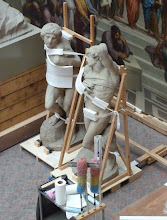(I drafted this blog back in November, but didn't want to post 'spoilers', hence left it as an unpublished draft till now)
Another blog I'll have to finish another time. So much to ponder in the Jez Butterworth play I saw today. Been dipping into the script since I got home, reminding myself of various aspects.
The Yeats poem/song seems so crucial to the overall theme - a folk myth about a fish that turns into a woman. Catching something - losing it (like the fish he caught when 7) or killing and eating it (a fish caught with a poacher's help in the one instance, and with lied-about skills learnt from a father - as a desperate ploy to get close, but through lying at the same time (since she actually hated fishing!) And the link with her father's death, like a fish flapping on the kitchen floor.
The girl at the end - was she from earlier in time: the preceding instance? Or was she after the others. The man's joyful expression seemed to suggest long-since lost happiness, giving me the impression that this was in the past - perhaps the first?
The sense of Groundhog Day style trapped repetitive story loops was strengthened by the seemingly impossible coincidence of the kamakaze robin. (the choice of bird - a flash of red?) Virtually the same words used over again, and the same unknown outcome (did the bird recover when placed outside and fly away - or was it dead?)?
The haunting glimpse by the blonde woman of some other laughing (and sighing) woman down by the river - a chilling and ghostly moment.
Her naked dive into the pool. Naked truth?
The bits that annoyed me and which seemed clunky - 'do you remember what you said then?' - this formula used over and over. But now I'm realising it must have been deliberate - an artificial bringing into the here and now of a (recent) memory - turning past actions and words into the stories we tell each other - the truths we must face, the bits we have to acknowledge and not edit out (or making truth into fiction?) Description of something rather than seeing it or hearing it directly (connecting with the sunset moment? Words painting the colours vividly for us, yet a distancing technique in context)
Another aspect that really struck me - how unconnected the man and woman seemed (and ditto the man and other woman) No touching. Talk of love-making, yet the opposite, in front of us, of any intimacy whatsoever. And certainly no hint of love! In either direction. A very strange atmosphere, a strange version of the male/female thing. Very unsettling! Not nice at all.
Us - the audience - our role in the piece. What we DON'T see and DON'T hear. The indirectness, the reliance on descriptive language - all that we get is a verbal conjuring up of the scenes we don't get to see - reports of past conversations, actions etc! There is a dissonance between what we see and what we are told - he has said 'I love you' to her, but we don't witness any hint of love in his body language or the way he interacts with either woman. The physical distance is palpable. Weird. Not naturalistic, heightened. The reports of love-making, with failure of intimacy (the looking away).
Reflections, water. Catching. Experiencing a sunset versus poetically (yet reductively) describing it - as always the same (the story with each woman - and more? - being always the same. No individuality?
Why is the face scratched out? Who gets the stone? Does anyone get to keep it? Was there a platonic real first form 'woman', with the later women mere shadows on the cave wall?
He says the woman in the scarlet dress didn't die.
Did the Other Woman leave, in the version we saw, or just go into the bedroom, never to emerge. (there is a discrepancy between the script and the staged version on this point - perhaps to protect the ambiguity?
The Other Woman impinged on the other time-frame, setting out the bowl and candles while the first woman is still on the stage. So black-haired woman seemed more memory-like, from the past. But it was a big surprise (complicating things hugely) when she asks about a pre-existing sketch of a woman in the red dress (the same dress? a coincidentally similar one?) with the face scratched out.
The scratching out of a face is an act that takes away individuality. It is also a destructive and violent action, seeming to stem from anger (or perhaps despair?)
Link between the women and fish - the people themselves trapped in a modern folktale.
Wednesday, 20 February 2013
Subscribe to:
Post Comments (Atom)

No comments:
Post a Comment